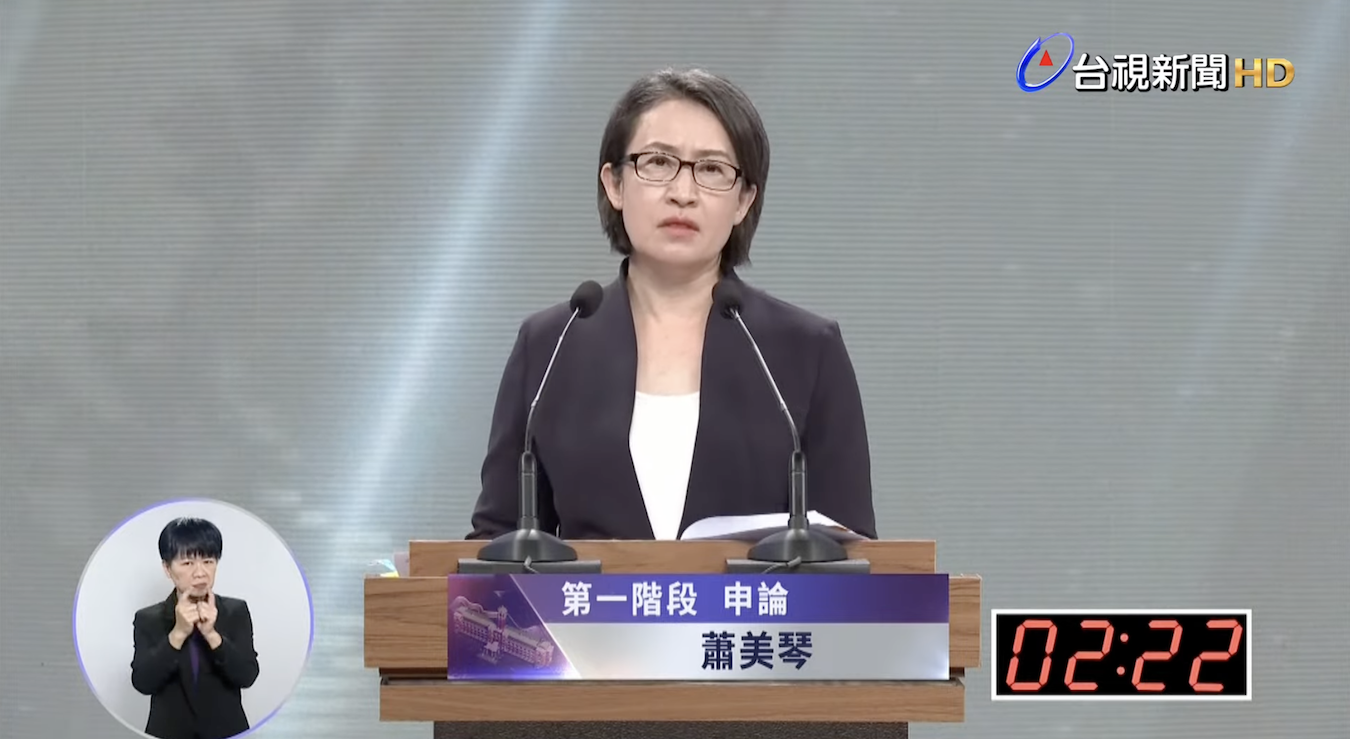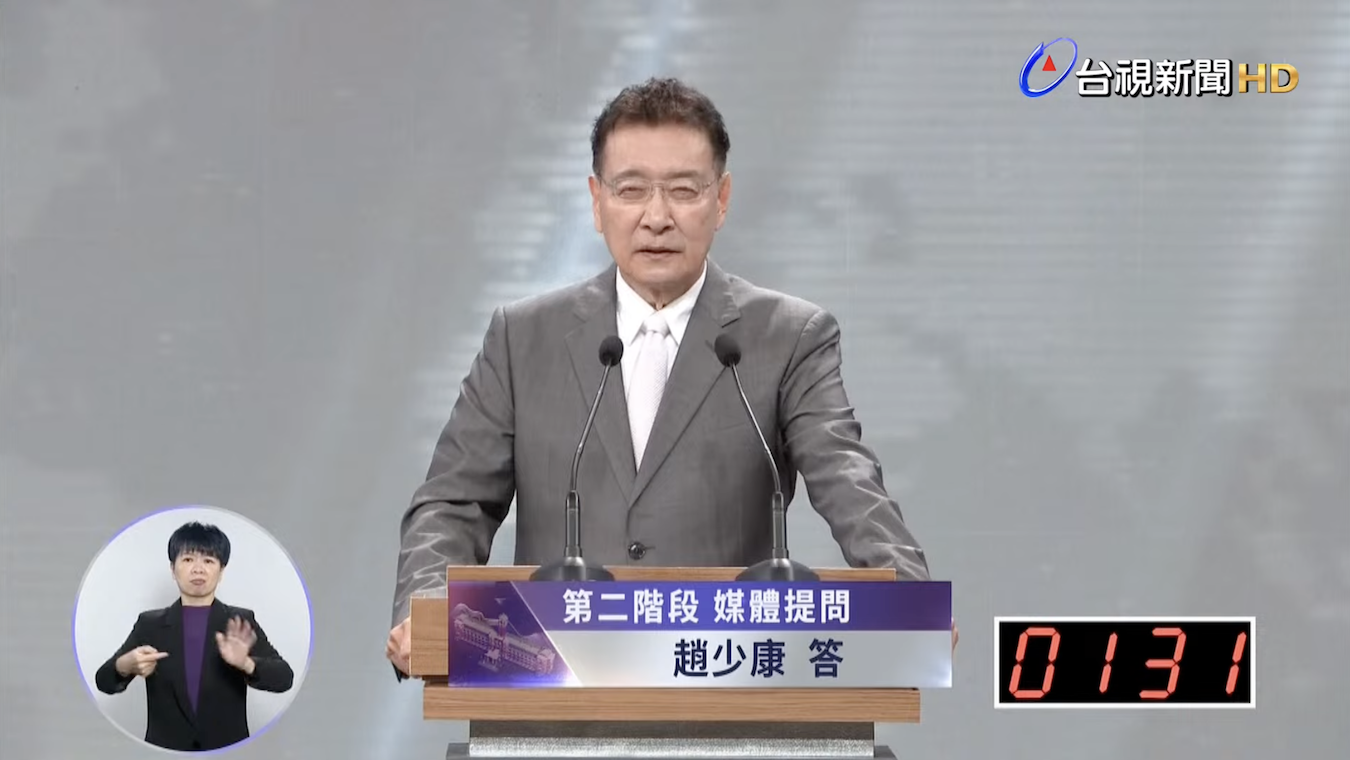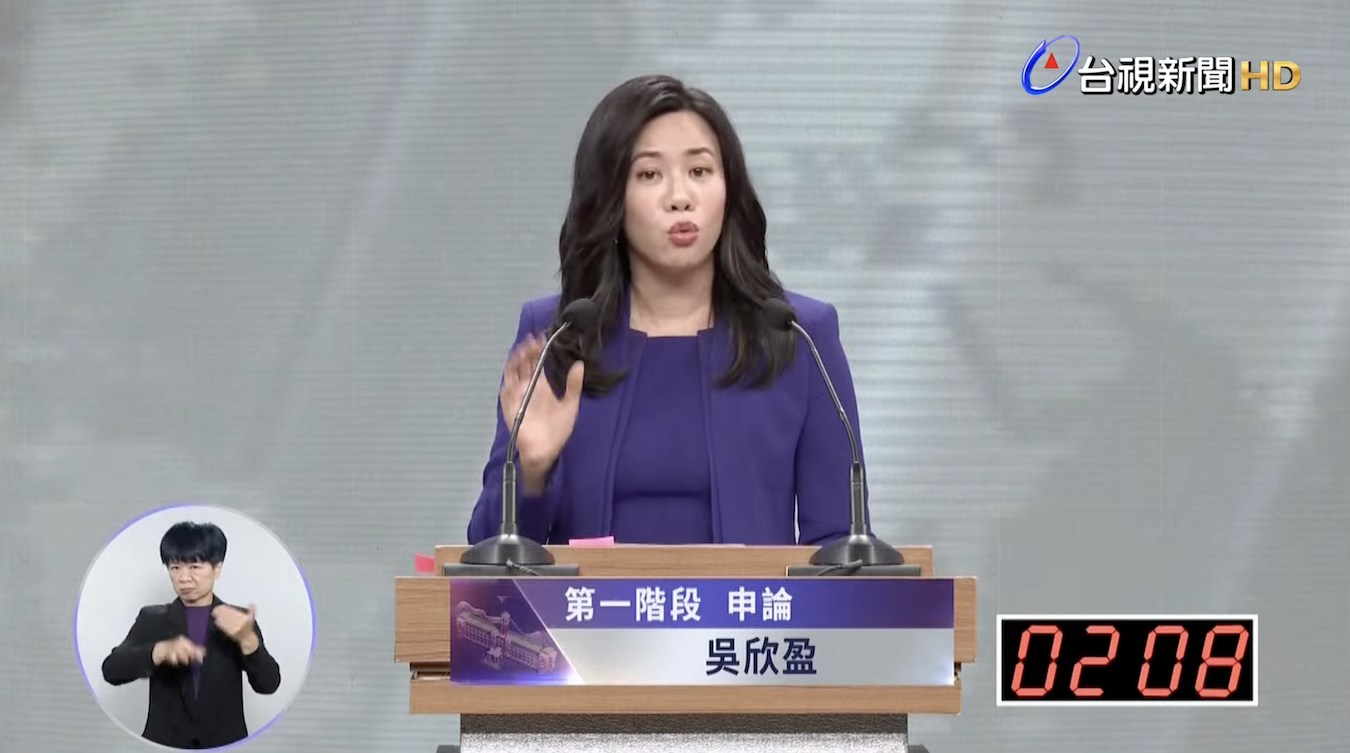by Brian Hioe
語言:
English
Photo Credit: TTV/Screenshot
THE VICE PRESIDENTIAL debate took place this afternoon. This was the last of the debates held as part of the presidential campaign season, coming after three presidential policy platform presentations that are not formal debates on December 20th, December 26th, and December 28th, one vice presidential presidential policy platform presentation, and one presidential debate.
The speaking order was Hsiao Bikhim of the DPP, Cynthia Wu of the TPP, and Jaw Shaw-kong of the KMT. As with the presidential debate on December 30th, the vice presidential debate consisted of a round of opening statements, a round of questioning by media experts, a round of exchanges between the candidates, and a round of closing statements.
 Hsiao Bikhim. Photo credit: TTV/Screenshot
Hsiao Bikhim. Photo credit: TTV/Screenshot
In her opening comments, Hsiao Bikhim primarily emphasized the Tsai administration’s successes in boosting Taiwan’s international standing. Hsiao’s comments largely echoed Tsai Ing-wen’s New Year’s address earlier today, in playing up strengthening political and economic ties between Taiwan and the international world. Hsiao stated that the world was highly attentive to the elections given the risks and that Taiwan faced a choice between aligning with international trends or disconnecting from the international world. Otherwise, Hsiao discussed how Tsai has come to be trusted by the international world, touted economic growth as a result of the Tsai administration’s efforts, framed Tsai as having successfully set a course for Taiwan forward amid geopolitical shifts as with the war in Ukraine or COVID-19, and stated that the DPP was better at governance than the KMT and so should be entrusted with leadership of Taiwan.
Next to speak was Cynthia Wu, Wu stated that she was the only candidate with practical experience in the field of finance, and this was what Taiwan should rely on rather than the war of words between the KMT and DPP. Wu brought up past profiles of her in magazines and touted past philanthropy. Wu claimed that the reason why Taiwan had not seen any increase in wages in the service sector, particularly affecting young people, is because the relevant measures in ECFA were blocked by the DPP and suggested that Taiwan had growing issues with safety, whether in terms of domestic safety or international threats, under DPP leadership. Wu further criticized shortages under the DPP and stated that Taiwan needs to adapt to deal with the AI age, suggesting Taiwan could import laws from the European Union as the GDPR.
Jaw closed off the opening round. Jaw announced that he was tired of waiting for Lai to fulfill his promise to donate his home to become a museum about miners and that he would go ahead with resigning as chair of the Broadcasting Corporation of China, as he claimed he would do if Lai donated his home. He then signed his resignation on the podium. Jaw accused Lai of having illicit ties with pharmaceutical companies, dating back to his time as a legislator, and suggested that this made him worse than Chen Shui-bian, who was not accused of graft before he became president. Jaw promised that he would not accept any salary as vice president and that he would donate the vice presidential residence to serve as a residence for young people instead of residing there. Jaw then brought up his family’s history of persecution at the hands of the CCP to dismiss claims that he was pro-China.
The subsequent round involved questions from media experts. Questions included asking how candidates hoped to increase the space Taiwan has internationally, how to resolve social divisions in a time of significant polarization, cross-strait stability, and defense.
Responses were mostly along expected lines. Jaw attacked the DPP as provoking China and causing Taiwan to lose diplomatic allies. Hsiao responded that it was not the DPP that was to be blamed for contributing to regional tensions, but the PRC, and that this was a form of victim-blaming. Hsiao stated that where defense was concerned, there was a need to purchase arms from other countries while building up domestic capacity when possible. Jaw claimed that the DPP had provoked China by pushing it on the definition of the 1992 Consensus, while Wu claimed the TPP would try to economically compete with China, and Hsiao reiterated that the Lai administration would maintain Tsai’s economic policy.
Jaw notably claimed during this round that the DPP controlled 80% of all Taiwanese media and had eradicated media that did not report favorably on it, such as CtiTV. Furthermore, at one point, Wu started to discuss tax policy and renewable energy, then offered praise of TPP chair and presidential candidate Ko Wen-je, in spite of the question being about social divisions and polarization in online spaces.
The following round, then, was devoted to exchanges between the candidates. This proved similar to the questions from media experts. Hsiao attempted to confront the KMT on where it planned to build nuclear reactors if it pushed for a return to nuclear energy, following up on criticisms of the KMT by Tsai Ing-wen during her New Year’s address. Wu responded by criticizing the DPP as too quick to give up on nuclear energy and push for renewables, while Jaw stated that the DPP should look to the US on nuclear policy, which it blindly imitates on most issues, and alleged that the DPP only pushed for green energy because of investments by DPP politicians in green energy companies. Hsiao responded by criticizing Jaw for smearing green energy. Jaw alleged that the DPP blocks infrastructure proposals from KMT-controlled local governments and criticized Tsai as a dictator, lashing out at that she does not normally hold press conferences.
 Jaw Shaw-kong. Photo credit: TTV/Screenshot
Jaw Shaw-kong. Photo credit: TTV/Screenshot
Jaw suggested that international investors were now afraid to invest in Taiwan given tensions, citing Warren Buffett and suggested that TSMC chair Mark Liu had resigned because he was tired of mismanagement by the Tsai administration, to which Hsiao responded by pointing to tech companies that have built up facilities in Taiwan in recent years. Wu argued for electronic voting, while Hsiao touted Taiwan’s accomplishments in e-governance.
Jaw focused fire in particular on an interview with Hsiao several decades ago in which Hsiao referenced no longer identifying with the KMT. Hsiao stated that this was in reference to how Taiwan goes by “Taiwan” and not “ROC” internationally and how in the past, many did not identify with the ROC because this was during the authoritarian period, but how Taiwan has now democratized. Strangely, Jaw seemed to allege that Hsiao may have fake educational credentials by pointing to how the article only referred to her being an Oberlin graduate and not her MA from Columbia University.
It is notable that Jaw and Wu both suggested that they hoped to work together in government. Wu offered Jaw a position as head of the National Communications Commission or a spokesperson of the Presidential Office if the TPP won. When probed on what shifting to a cabinet-style system would mean, Jaw stated that this was to open the path for coalition governance. During one of the rare moments of agreement between the candidates, Wu suggested that the three of them get barbecue after the debate, while Hsiao suggested that all three candidates viewed AI as important for Taiwan and that they could exchange views. Jaw argued that Taiwan should focus on AI as its next core technology after semiconductors, as it was too late for Taiwan to catch up in terms of electric vehicle development.
In this round, Wu’s comments were again strange, in that she tried to return to the previous question during the round of questions from media experts which she had given a completely different response to than the question. At one point, Wu criticized the other candidates for ignoring her, when–as she put it–the TPP has 30% support.
In the final round, candidates offered closing statements. This went in the opposite order of the opening statements, as a result of which Jaw spoke first.
Jaw claimed that a gaffe by Lai about the danger of the ROC constitution reflected his true views of the ROC constitution while stating that the KMT maintained ties with China even after its retreat to Taiwan, which was why it could maintain cross-strait peace. Jaw suggested that Taiwan would see more military exercises, such as followed then-US Speaker of the House Nancy Pelosi’s visit to Taiwan, if Lai won. Jaw alleged that the DPP manufactured news incidents about Chinese interference such as the Wang Liqiang case or Chou Tzu-yu incident and that in this current election cycle, this was regarding allegations in China against Mayday of lip-synching. Jaw called on Mayday to speak up about the incident and alleged that this was concocted by the DPP, working with international media. Jaw stated that he would investigate and get to the bottom of the case, to hold them legally responsible, if the KMT won.
 Cynthia Wu. Photo credit: TTV/Screenshot
Cynthia Wu. Photo credit: TTV/Screenshot
Wu’s closing comments focused on stating that the TPP was the only party in Taiwan that would firmly deal with the issues facing Taiwan. Wu claimed that the “PP” in TPP could also stand for “peace and prosperity.”
Hsiao’s closing comments emphasized the vision and drive of the Tsai administration in strengthening ties with the international world, even when this meant taking political risks. Hsiao reiterated that it was the CCP that was threatening regional stability rather than the DPP, that she and Lai would continue Tsai’s policies, and criticized the KMT for taking its lines of attack from China’s Taiwan Affairs Office (TAO), stating that it simply echoed the TAO’s line. She thanked the Taiwanese people for the opportunities they had given her and stated that the Lai administration would allow Taiwan to continue to shine internationally.
Most noteworthy from the debate was that the TPP and KMT continued to try and outreach to each other, keeping the path open for coalition governance. Jaw relied heavily on stunts and outright disinformation in his comments, with it pointed out at one point by Hsiao that Jaw’s rhetoric has now come to dominate the KMT campaign and overshadow that of Hou You-yi. On the other hand, Hsiao hewed closely to Tsai Ing-wen’s statements earlier today during her New Year’s address, perhaps to give weight to her claim that the Lai administration would continue the Tsai administration’s policies. Voting will take place on January 13th.

